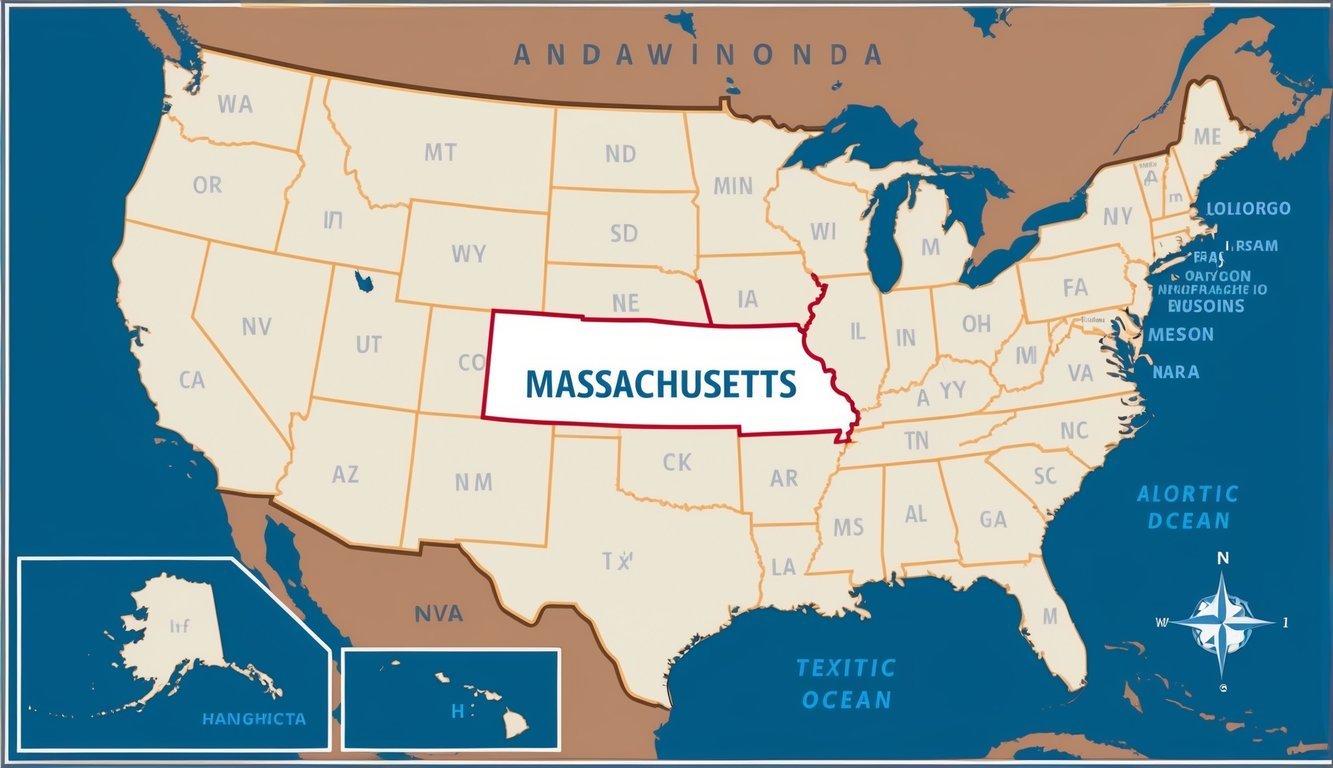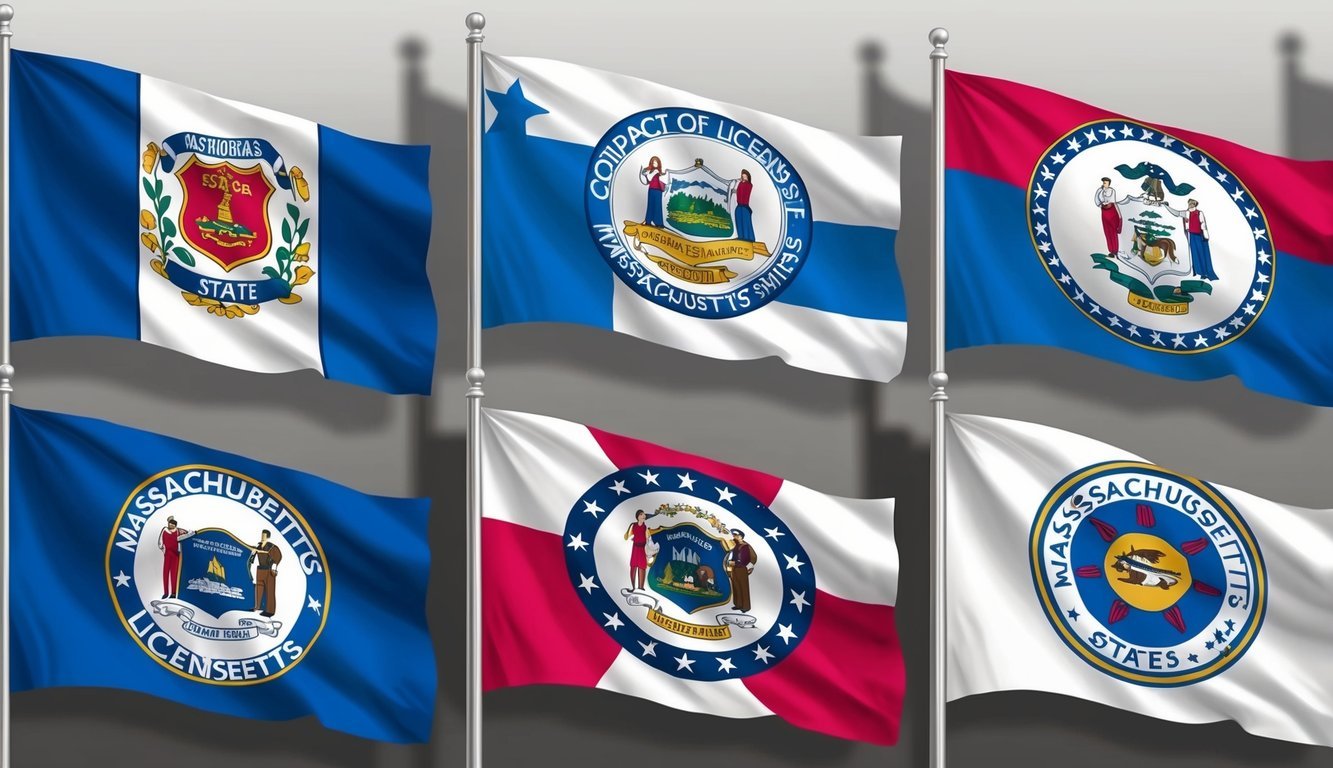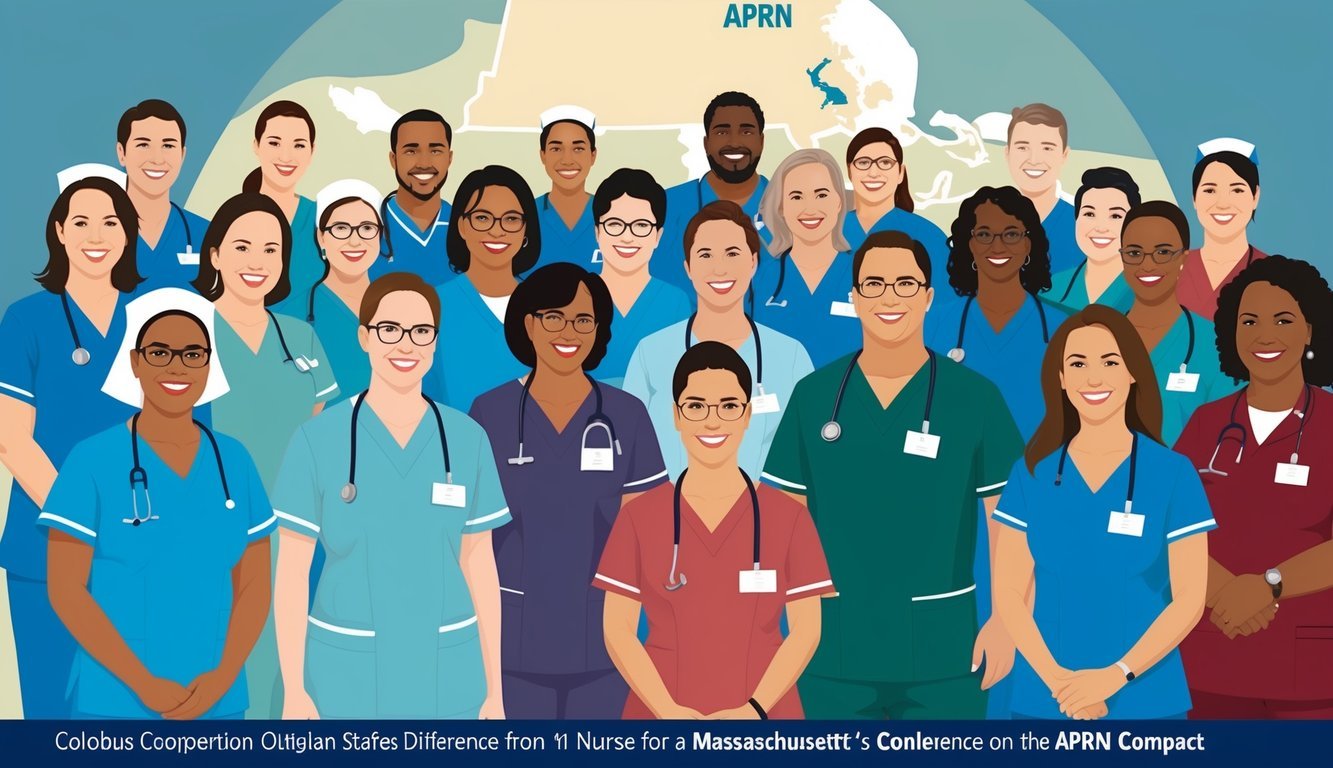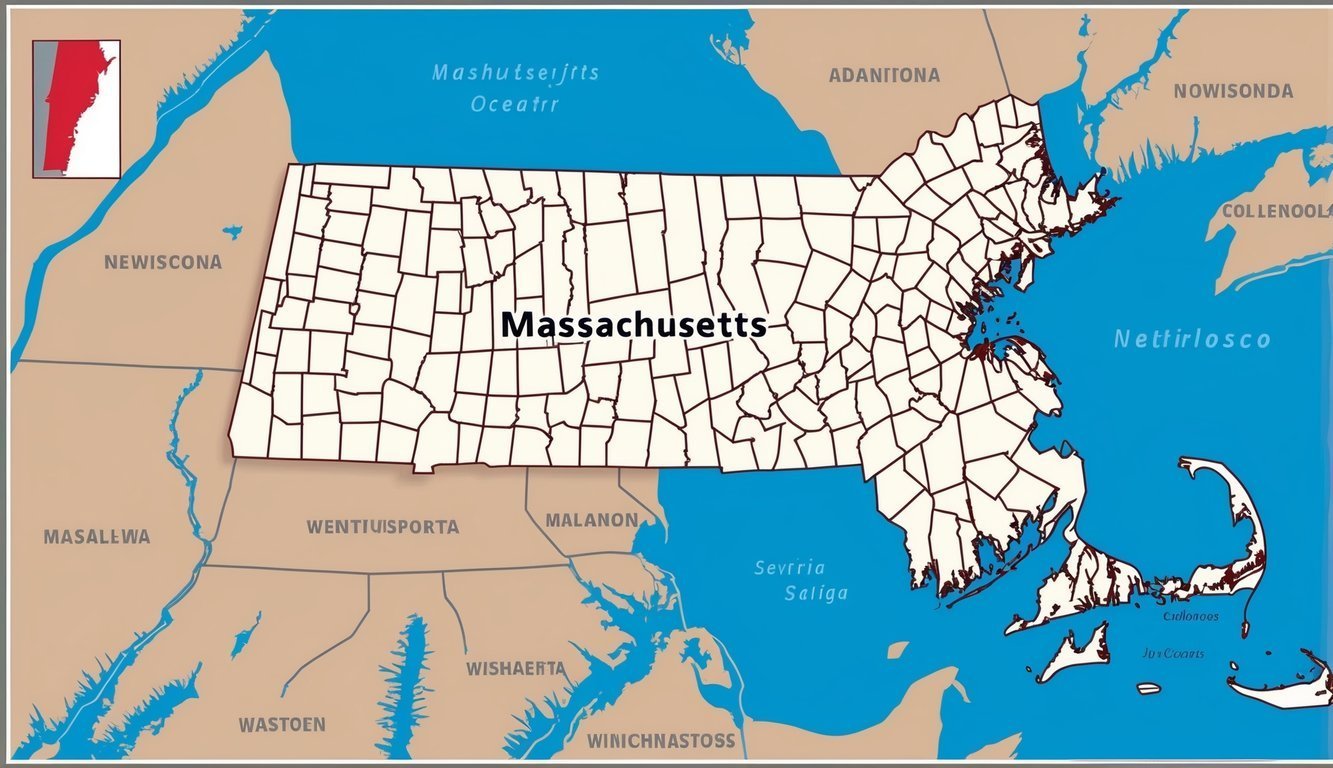If you’re a nurse thinking about working in multiple states, you may be wondering about compact licensing. Massachusetts is a member of the Nurse Licensure Compact (NLC).
This means nurses can practice in other compact states with a single multistate license. This can simplify your career if you’re considering relocation or travel nursing.
Understanding how this compact works is crucial for navigating your license requirements.
Massachusetts, like other NLC member states, has specific procedures in place for those seeking compact licensure.
Key Takeaways
- Massachusetts holds membership in the Nurse Licensure Compact (NLC).
- Nurses can practice in other states without needing separate licenses.
- Familiarity with the licensure process can enhance your job opportunities.
What Is the Nurse Licensure Compact (NLC)?

The Nurse Licensure Compact (NLC) is an agreement between participating states that allows nurses to practice with a multistate license.
This means you can work in any compact state without needing to obtain additional licenses.
Key Features of the NLC:
- Multistate License: Registered nurses (RNs) and licensed practical/vocational nurses (LPNs/LVNs) can hold a single license that grants them the ability to work in multiple states.
- Single-State License: If you have a single-state license, it only allows you to practice in that state, limiting your job opportunities.
- Enhanced Standards: The NLC has specific requirements, including fingerprint-based criminal background checks, ensuring high standards of care.
Benefits of the NLC:
| Benefit | Description |
|---|---|
| Increased Mobility | Easily practice in different states. |
| Streamlined Process | Saves time and effort in obtaining multiple licenses. |
| Enhanced Patient Safety | Maintains high standards of nursing practice. |
The National Council of State Boards of Nursing (NCSBN) oversees the NLC to ensure that the agreement meets its goals effectively.
The NCSBN website provides further information on compact states and their requirements.
Massachusetts’ Status as a Compact State

Massachusetts is currently considering joining the Nurse Licensure Compact (NLC).
The state has not yet fully adopted the compact, but there is pending legislation aimed at advancing this initiative.
As of now, Massachusetts is in a stage of partial implementation.
This means that while discussions are underway, the actual transition to a compact state is still in progress.
Key Points About Massachusetts’ Status
| Status | Details |
|---|---|
| Compact Membership | Not yet a member of the NLC |
| Pending Legislation | Legislation is being discussed |
| Implementation Stage | Partial implementation |
| Expected Benefits | Easier license transfer between states |
| Current State of Nurses | Nurses must hold separate licenses for each state |
If Massachusetts joins the NLC, registered nurses and licensed practical/vocational nurses will have the option of obtaining a multistate license.
They will be able to practice in other compact states without needing additional licenses.
The Massachusetts Health & Hospital Association has shown strong support for this shift.
They argue it will help the healthcare workforce and improve patient care.
You can follow the updates regarding the legislation on the Massachusetts government website.
Requirements and Process for Compact Licensure

To practice under the Nurse Licensure Compact (NLC), you must meet specific requirements.
Here are the essential steps and criteria for obtaining a compact nursing license.
Eligibility Criteria
- Primary State of Residence: You must declare a primary state of residence that is a compact state.
- NCLEX-RN: Passing the NCLEX-RN is typically required for registered nurses.
- Criminal Background Checks: You must provide a complete criminal background check.
Application Process
| Step | Description |
|---|---|
| Submit Application | Complete the application for a multistate license through your state board. |
| Provide Social Security Number | You’ll need your valid Social Security number. |
| Pay Application Fee | An application fee is usually required. Check your state’s board for specific costs. |
| Licensure by Endorsement | If applicable, you may apply for licensure by endorsement from another state. |
Additional Requirements
- Credential Evaluation: You may need to submit credentials to CGFNS or other evaluations depending on your education.
- Nursys Registration: Ensure you are registered with Nursys for verification of your licensure.
By fulfilling these requirements, you can apply for a compact nursing license, allowing you to practice in multiple states that participate in the NLC.
For more detailed information, you can visit the NCSBN’s Compact page.
Benefits and Limitations of the Compact License for Nurses

The Nurse Licensure Compact (NLC) offers several benefits for nurses.
-
Job Opportunities: With a compact license, you can practice in multiple states without needing to apply for individual licenses. This greatly expands your job options across state lines.
-
Access to Care: The NLC enhances access to care, especially important during times like the COVID-19 pandemic. Nurses can quickly respond to health care needs in different areas more easily.
-
Reciprocity: You can work in partner states seamlessly. This is especially useful for travel nurses who enjoy working in various locations.
-
Telehealth Services: The compact supports telehealth by allowing you to serve patients across state borders without additional licensing issues.
Despite these benefits, there are also limitations to consider.
-
Licensure Standards: Each state may have different standards. If a state’s standards are stricter than NLC guidelines, you may still face challenges.
-
Limited Member States: Not every state participates in the compact. This can restrict your ability to work in certain areas.
-
Background Checks: States may have their own requirements for background checks. This might create confusion or delays for some nurses.
Advanced Practice Registered Nurse (APRN) Compact and other Nursing Professions

The APRN Compact streamlines licensing for Advanced Practice Registered Nurses (APRNs).
This agreement allows you to practice in multiple states with one license.
It addresses workforce shortages and improves access to care.
Key Benefits of the APRN Compact
- Mobility: Work across state lines without needing separate licenses.
- Access: Patients gain greater access to care from APRNs in diverse locations.
- Flexibility: Supports travel nurses who seek varied employment opportunities.
Here are some common nursing roles relevant to the APRN Compact:
| Nursing Role | Description |
|---|---|
| Advanced Practice Registered Nurses (APRNs) | Nurses with advanced education, including Nurse Practitioners and Clinical Nurse Specialists. |
| Licensed Practical Nurses (LPNs) | Provide basic nursing care under the supervision of RNs and physicians. |
| Travel Nurses | LPNs or RNs who take temporary positions in various locations to meet staffing needs. |
| LVN | Typically similar to LPNs, specifically in California and Texas. |
You should also be aware of the NCLEX-PN exam, which LPNs need to pass for licensure.
Resources like the NCSBN can help you understand more about licensure and the APRN Compact.
The APRN Compact is an essential development in nursing, offering many benefits for APRNs and other nursing professionals.
This program supports you in your pursuit of a flexible and rewarding career in healthcare.
Future of Nursing Licensure: Trends and Possibilities
The landscape of nursing licensure is evolving rapidly.
States are increasingly joining the Enhanced Nurse Licensure Compact (eNLC), allowing nurses to practice across state lines more easily.
This trend supports travel nursing, giving you more job opportunities.
Key Trends
| Trend | Description |
|---|---|
| Enhanced Nurse Licensure Compact (eNLC) | Streamlines multi-state licensing for nurses. |
| Telemedicine | Expands options for patient care, requiring flexible licensure. |
| Foreign-Educated Nurses | Increasing pathways for foreign-educated nurses to obtain licensure. |
| License Renewal Simplification | More states are adopting simpler processes for re-licensing. |
You may find that some states expedite the process for nursing license by reciprocity.
This can help you transition into a new state more smoothly.
With the rise of telemedicine, many states are considering how to adapt their licensing requirements.
This will likely impact the Nurse Licensure Compact (NLC) implementation, affecting how you can practice remotely.
As the nursing workforce continues to change, staying informed about your state’s position on these trends is essential.
Being proactive in understanding where your state stands could offer you more options in your nursing career.
The nursing profession will continue to embrace innovative pathways.
Keeping track of developments can help you navigate these changes effectively.
Frequently Asked Questions
In this section, you will find answers to common questions regarding Massachusetts and its status as a compact state for nursing licensure.
This includes comparisons with other states, requirements for licensure, and relevant implications for nurses.
How does Massachusetts compare with other compact states in terms of nursing licensure?
Massachusetts is not currently a member of the Nurse Licensure Compact (NLC).
While many states allow nurses to practice across state lines with a single license, Massachusetts has its own regulations.
This may create challenges for nurses wishing to work in multiple states.
What are the requirements to obtain a nursing license in Massachusetts?
To obtain a nursing license in Massachusetts, you must complete several steps.
These include graduating from an approved nursing program, passing the NCLEX-RN exam, and submitting the application with required documents.
Additionally, you must undergo a criminal background check and provide proof of English proficiency if applicable.
Which states are included in the Nurse Licensure Compact as of 2024?
As of 2024, the Nurse Licensure Compact includes 41 states and territories.
Some of the states include Utah, Virginia, and Washington.
A full list can be found on resources like Nurse.org.
What is the process to transition to a compact state for nursing?
To transition to a compact state for nursing, a nurse must first meet the licensing requirements of the new state.
This often involves submitting an application for licensure by endorsement.
In Massachusetts, nurses wanting to practice in compact states need to verify their licenses and achieve the required qualifications.
Are there plans for Massachusetts to join the Physical Therapy Compact?
Currently, discussions and movements are happening regarding Massachusetts joining the Physical Therapy Compact.
However, no official plan has been enacted yet.
Keeping an eye on legislative updates will be important for any changes in this area.
What are the implications for nurses licensed in non-compact states practicing in compact states?
Nurses licensed in non-compact states face restrictions when practicing in compact states.
They may need to apply for a compact license or an endorsement license in the state where they wish to work.
This can involve additional costs and time for fulfilling the requirements.

